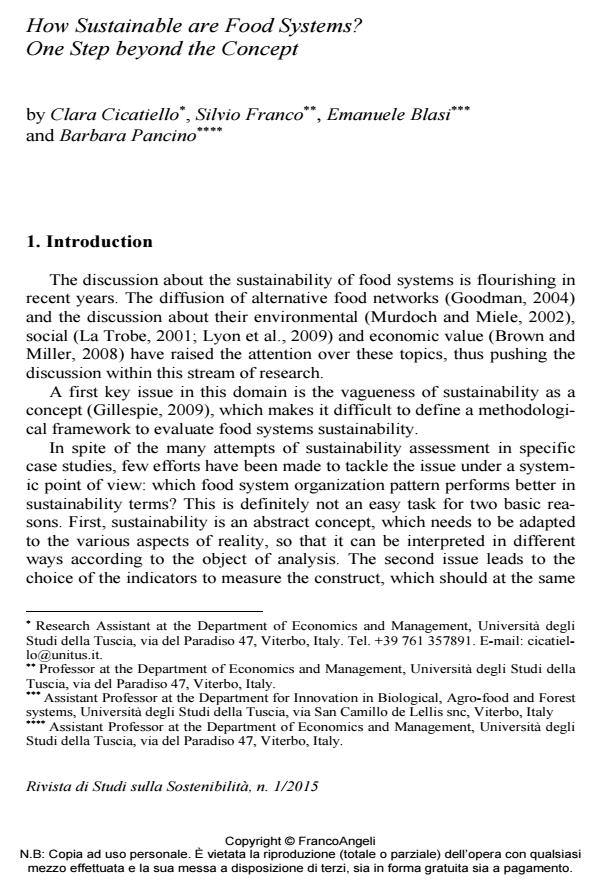How Sustainable are Food Systems? One Step beyond the Concept
Titolo Rivista RIVISTA DI STUDI SULLA SOSTENIBILITA'
Autori/Curatori Clara Cicatiello, Silvio Franco, Emanuele Blasi, Barbara Pancino
Anno di pubblicazione 2015 Fascicolo 2015/1
Lingua Inglese Numero pagine 16 P. 181-196 Dimensione file 184 KB
DOI 10.3280/RISS2015-001012
Il DOI è il codice a barre della proprietà intellettuale: per saperne di più
clicca qui
Qui sotto puoi vedere in anteprima la prima pagina di questo articolo.
Se questo articolo ti interessa, lo puoi acquistare (e scaricare in formato pdf) seguendo le facili indicazioni per acquistare il download credit. Acquista Download Credits per scaricare questo Articolo in formato PDF

FrancoAngeli è membro della Publishers International Linking Association, Inc (PILA), associazione indipendente e non profit per facilitare (attraverso i servizi tecnologici implementati da CrossRef.org) l’accesso degli studiosi ai contenuti digitali nelle pubblicazioni professionali e scientifiche.
The sustainability of food systems is a topical issue in recent years, but the definition of this concept is still very unclear. This paper aims to face this challenge, in order to support a sustainability assessment of the food systems. Such a definition should tackle the underpinning dimensions of sustainability, i.e. the environmental, social and economic domains. Once the sustainability concept has been defined, an interpretative framework to assess food system sustainability can be proposed, and indicators to measure these issues are discussed. Many have already been tested at the operative level, but it remains unclear how to measure some social and economic issues. Suggestions on how to fill these gaps are discussed in the paper, so as to provide a more comprehensive understanding of how food systems sustainability may be measured in the practice.
La sostenibilità dei food system è un tema molto dibattuto negli ultimi anni. In questo contributo affrontiamo la definizione di questo concetto, che è ancora poco chiara, con la finalità di supportare a livello teorico/metodologico una valutazione della sostenibilità dei food system. Nel fare ciò, ci riferiamo alle tre dimensioni della sostenibilità - l’ambiente, la società e l’economia - tentando per ognuna di queste uno sforzo di concettualizzazione. A seguito di questo sforzo definitorio, proponiamo un modello interpretativo per misurare la sostenibilità dei food system, per poi discutere con quali indicatori possono essere misurati gli elementi che lo compongono. Il risultato è che, nonostante siano state svolte molte ricerche a livello empirico, alcuni aspetti rimangono poco chiari, soprattutto per quanto riguarda la valutazione degli aspetti sociali ed economici. Il contributo si conclude con alcune proposte su come superare questi gap della ricerca, in modo da favorire una più profonda comprensione di come la sostenibilità dei food system può essere misurata.
Parole chiave:Indicatori di sostenibilità, valutazione della sostenibilità, filiera agroalimentare, filiera sostenibile
Clara Cicatiello, Silvio Franco, Emanuele Blasi, Barbara Pancino, How Sustainable are Food Systems? One Step beyond the Concept in "RIVISTA DI STUDI SULLA SOSTENIBILITA'" 1/2015, pp 181-196, DOI: 10.3280/RISS2015-001012